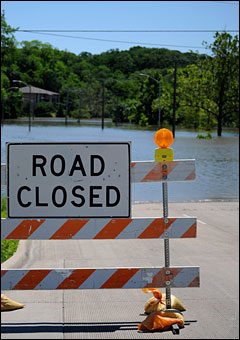severe weather
-
Republican House members ask EPA to scale back ethanol mandate
More than 50 Republican representatives sent a letter [PDF] to the Environmental Protection Agency last week urging the agency to lower the mandate for ethanol production in response to both the recent flooding in the Midwest and drought in the South. They argue that one-third of the country’s corn crop will be used for ethanol […]
-
Sen. Grassley: Screw conservation, let’s grow more corn!
Here in the U.S., our grocery bills are rising faster than they have since Gerald Ford bumbled about the Oval Office. Across the globe, the recent surge in crop prices is putting sufficient food out of reach of millions of people. The dismal human dimension of the food crisis has been amply (if sporadically) covered […]
-
Iowa’s chefs and their farmer-suppliers get busy recovering from disaster
Roads and restaurants may be closed, but Iowa is getting back on its feet. Photo: Kurt Michael Friese The weather here in Iowa City has been gorgeous for more than a week. Is Mother Nature trying to make amends? While she smiles on us, she’s still causing trouble for our friends to the south. The […]
-
Climate change means worse droughts for American Southwest, Australia
 Part one presented the synopsis of the remarkable new U.S. Climate Change Science Program (a.k.a. the Bush Administration) report, Weather and Climate Extremes in a Changing Climate. One central point in the synopsis is
Part one presented the synopsis of the remarkable new U.S. Climate Change Science Program (a.k.a. the Bush Administration) report, Weather and Climate Extremes in a Changing Climate. One central point in the synopsis isDroughts are becoming more severe in some regions, though there are no clear trends for North America as a whole ... Substantial areas of North America are likely to have more frequent droughts of greater severity.
Seems pretty clear, no? Dry areas will see more evaporation, hence less soil moisture (defined as precipitation minus evaporation), hence more drought. Further, many dry areas will see less precipitation under climate change (due to the expansion of the Hadley Cell and subtropics, see "Australia faces the 'permanent dry,' as do we").
-
The Midwest will suffer if we don’t change our approach to flood protection
We've heard a lot this week about how the floods in the Midwest might be an act of humans -- or an act of City Council, as one Iowan leader put it. We can start the futile cycle of fighting Mother Nature again if we want to: spend billions of dollars on levees and flood control infrastructure, encouraging development of river floodplains and low-lying wetlands, then watch those homes and businesses be overrun by flood water.
-
The toll of the shrimping industry on Southeast Asia
Southeast Asia would have fared better during the tsunami and the recent cyclone if the majority of the region's coastal mangrove forests were intact. Everyone accepts that. But many of the mangroves have been cut for firewood, largely to make way for shrimp farming. The cost of the mangrove-loss to coastal fisheries is great, since much of the food chain spends its early years amongst the trees' roots.
But the human cost, besides those lost in the flood waters, is also great: Labor abuses in the farmed shrimp industry are rampant. Read "The True Cost of Shrimp" (PDF) for details on the child labor, human trafficking, beatings, torture, and murder associated with these farms. There are also toxins that farm workers get to enjoy spraying into the shrimp pens to keep the critters from succumbing to infections. So, what to do?
-
Midwest woes a boon to fertilizer companies
The recent Midwestern floods have caused all manner of misery: Burst levies, lost homes, ruined crops, higher food prices, a gusher of agrichemicals and god know what else flowing into streams. One way to soothe the sting is to own shares in giant fertilizer companies like Potash Corp. of Saskatewan and Mosaic. These companies have […]
-
Four short films explore how climate change affects women worldwide
“Is climate change a feminist issue?” NewScientist enviro blogger Catherine Brahic asked last week, then answered, “[F]or me, climate change is not a gender issue. Climate change will not affect women more than men.” She was responding to several short films Oxfam recently produced that profile four women in Brazil, Uganda, the U.K., and Bangladesh. […]
-
Rebuilding in the wake of ‘extreme weather’
From the standpoint of global climate change, nature's incredible assault on the American heartland this year can be interpreted in one of two ways. Both offer lessons about the challenges of adapting to the climate we have created.
As of June 13, 1,577 tornadoes had been reported in the United States, with 118 fatalities. The season started in January, unusually early, with more than 130 reported tornadoes in the upper Midwest. As if to send voters a reminder to ask the presidential candidates about their positions on climate change, 84 tornadoes broke out the week of Super Tuesday in Missouri, Illinois, Arkansas, Alabama and Tennessee.
As I write this post, record floods are inundating communities in the Mississippi River Valley at a level of intensity that may make the Great Flood of 1993 seem like an "ankle tickler," as riverside residents like to call minor flood events.
On June 9 in Wisconsin, a breach in its dam emptied Lake Delton, a 245-acre man-made lake, into the Wisconsin River. My old stomping grounds in Wisconsin's Kickapoo River Valley suffered record flooding for the second time in a year. Among the inundated communities was Gays Mills, now threatened with extinction due to its repeated damages.
